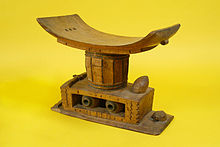
Cape Coast is a city, fishing port, and the capital of Cape Coast Metropolitan District and Central Region of Ghana. It is one of the country's most historic cities, a World Heritage Site, home to the Cape Coast Castle, with the Gulf of Guinea situated to its south. It was also the first capital of Ghana. According to the 2021 census, Cape Coast had a settlement population of 189,925 people. The language of the people of Cape Coast is Fante.

The University of Cape Coast (UCC) is a public collegiate university located in the historic town of Cape Coast in the central region of Ghana. The campus has a rare seafront and sits on a hill overlooking the Atlantic Ocean. It operates on two campuses: the Southern Campus and the Northern Campus. Two of the most important historical sites in Ghana, Elmina and Cape Coast Castle, are a few kilometers away from its campus.

Prempeh College is a public secondary boarding school for boys located in Kumasi, the capital city of the Ashanti Region, Ghana. The school was founded in 1949 by the Asanteman traditional authority, the British Colonial Government, the Methodist Church Ghana and the Presbyterian Church of Ghana. The school is named after the King of Ashanti (Asantehene), Sir Osei Tutu Agyeman Prempeh II, who donated the land on which the school was built, and was modeled on Eton College in England.

Nana Addo Dankwa Akufo-Addo is a Ghanaian politician who has served as the president of Ghana since 2017. He previously served as Attorney General from 2001 to 2003 and as Minister for Foreign Affairs from 2003 to 2007 under the Kufuor-led administration.
Felicity Ama Agyemang, also known as Nana Ama McBrown, is a Ghanaian actress, TV show hostess, and music composer. She rose to prominence for her role in a television series titled Tentacles. Later, she found mainstream success following her role in the Twi-language movies " Asoreba" and "Kumasi Yonko". She was the host, of the television cooking show McBrown Kitchen and an entertainment talk show United Showbiz on UTV until March 2023 when she moved to Media General. She is a TV show hostess on Onua TV for the Onua Showtime program.

Jane Naana Opoku-Agyemang is a Ghanaian academic and politician who served as Minister for Education from February 2013 to January 2017. She is a full professor of literature. She served as the first female Vice-Chancellor of a state university in Ghana when she took over as Vice-Chancellor of University of Cape Coast. She currently serves as the Chancellor of the Women's University in Africa.
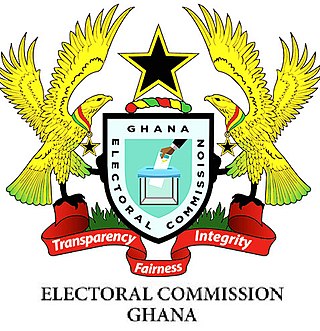
The Electoral Commission of Ghana (EC) is the official body in Ghana responsible for all public elections. Made up of seven members and there are seven (7) functional departments at the Head Office. Each department is headed by a Director who is assisted by Unit Heads. The departments are:- Electoral services; Human Resource; Finance; Training; Administration; Research, Monitoring & Evaluation; Information Technology. its independence is guaranteed by the 1992 Ghana constitution. The current commission was established by the Electoral Commission Act (Act 451) of 1993. Kwadwo Afari-Gyan was the first substantive chairman of the commission in the Fourth Republic of Ghana, from 1993 to 2015. He was succeeded by Charlotte Osei as the first female chairman of the commission from 2015 to June 2018. Jean Adukwei Mensah succeeded Charlotte Osei in July 2018. On December 5, 2018, the Electoral commission chaired by Jean Adukwei Mensah reverted to the old logo showing the Coat of arms of Ghana and a ballot box showing the hand casting its votes, after the controversy over the new logo.

Rebecca Naa Okaikor Akufo-Addo is a Ghanaian public figure and the First Lady of Ghana. She is the wife of President Nana Akufo-Addo.
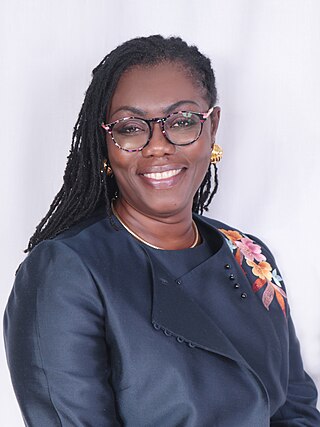
Ursula Owusu-Ekuful is a Ghanaian lawyer, women's rights activist, and a politician who has been actively involved in politics and public service. She is the member of Parliament for Ablekuma West Constituency in the Greater Accra Region. She is currently the Minister of Communications and Digitalisation.

Queen mother is a term used to describe certain female traditional rulers in African cultures. Though there is no general description of a "queen mother", as their roles have varied by society, political context, and culture, they generally play an important role in local government and "wield social power and influence."
Nana Afia Kobi Serwaa Ampem II was the Queen mother (Ohemaa) of the Ashanti Kingdom and mother of the current Asantehene, Otumfuo Nana Osei Tutu II, who is the youngest son of her five children. She was the 13th Queen mother of the Ashanti Kingdom.
Paul Okoh is a Ghanaian diplomat and a member of the New Patriotic Party of Ghana. He is currently Ghana's ambassador to Egypt.

Eunice Nana Akosua Konadu, also known as Nana Akosua Konadu, is a Ghanaian broadcaster and the CEO and founder of Enak Consult. She is the host of the talk show The Hard Truth.
Harona Esseku was a Ghanaian politician who served as Ghana's Minister for Transport and Communications from 1969 to 1971. He was approved as a cabinet minister at an age of thirty-five making him the youngest cabinet member of the Second Republic. In the Fourth Republic, he became a founding member of the New Patriotic Party and was National Chairman of the party from 2001 to 2005.
Nana Awuah Darko Ampem (1932–2005) was a Ghanaian financier and chief. He founded Vanguard Assurance in October 1974 and was chairman of the company until his death in November 2005. He also held traditional office as Nkosuohene of Asante Juaben from 1985 until his death. He was a founding member of CAL Bank in 1990 and was a director of the bank’s board until his death.
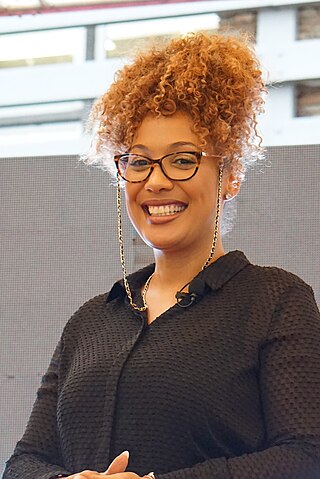
Sandra Don-Arthur is a professional makeup artist and Vlogger from Ghana. She is the founder and C.E.O of Alexiglam Studio, a Ghanaian makeup and beauty company that provides beauty services to women in Ghana.
Joyce Anima Misa Amoah is a Ghanaian actress, playwright and a director.

Stephen Amoah is a Ghanaian politician who is a member of the New Patriotic Party (NPP). He is the member of parliament for the Nhyiaeso Constituency. He is currently a board member of GCB Bank.
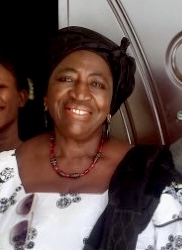
Mama Atrato II is the queen mother of Ho-Dome in the Asogli Traditional area of the Volta region of Ghana.

